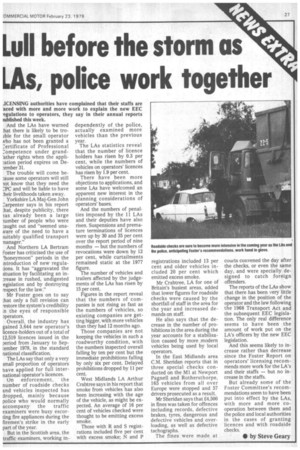Lull before the storm as LAs, police work together
Page 29

If you've noticed an error in this article please click here to report it so we can fix it.
ICENS1NG authorities have complained that their staffs are 'aced with more and more work to explain the new EEC .egulations to operators, they say in their annual reports mblished this week.
And the LAs have warned ;hat there is likely to be troAle for the small operator who has not been granted a :ertificate of Professional :ompetence under grand'ather rights when the appli:ation period expires on De:ember 31.
The trouble will come be:ause some operators will still lot know that they need the :PC and will be liable to have :heir livelihoods taken away.
Yorkshire LA Maj-Gen John :arpenter says in his report ;hat, despite publicity, there las already been a large Dumber of people who were :aught out and "seemed unaware of the need to have a 3uitably qualified transport ;nanager."
And Northern LA Bertram Foster has criticised the use of 'honeymoon" periods in the ,ntroduction of new regula:ions. It has "aggravated the 3ituation by facilitating an in:Tease in rushed, undigested legislation and by destroying respect for the law."
Mr Foster goes on to say that only a full revision can restore the system's credibility in the eyes of responsible Dperators.
Overall, the industry has gained 3,644 new operator's licence-holders out of a total of 12,519 licences issued in the period from January to September 1978, in the standard national classification.
The LAs say that only a very small proportion of operators have applied for full international operator's licences.
On enforcement, ' the number of roadside checks and vehicles inspected has dropped, mainly because police who would normally accompany the traffic examiners were busy escorting fire appliances during the firemen's strike in the early part of the year.
But in the Scottish area, the traffic examiners, working in dependently of the police, actually examined more vehicles than the previous year. The LAs statistics reveal that the number of licence holders has risen by 0.3 per cent, while the numbers of vehicles on operators' licences has risen by 1.9 per cent.
There have been more objections to applications, and some LAs have welcomed an apparent new interest in the planning considerations of operators' bases.
And the numbers of penalties imposed by the 11 LAs and their deputies have also risen. Suspensions and premature terminations of licences were up by 30 and 35 per cent over the report period of nine months — but the numbers of revocations were down by 12 per cent, while curtailments remained static at the 1977 figure.
The number of vehicles and trailers affected by the judgements of the LAs has risen by 15 per cent.
Figures in the report reveal that the numbers of companies is not rising as fast as the numbers of vehicles, so existing companies are getting bigger, with more vehicles than they had 12 months ago.
Those companies are not keeping the vehicles in such a roadworthy condition, with the numbers inspected overall falling by ten per cent but the immediate prohibitions falling by only six per cent. Delayed prohibitions dropped by 11 per cent.
West Midlands LA Arthur Crabtree says in his report that smoke from vehicles has also been increasing with the age of the vehicle, as might be expected. An average of 16 per cent of vehicles checked were thought to be emitting excess smoke.
Those with R and S registrations included five per cent with excess smoke; N and P registrations included 13 per cent and older vehicles included 20 per cent which emitted excess smoke.
Mr Crabtree, LA for one of Britain's busiest areas, added that lower figures for roadside checks were caused by the shortfall of staff in the area for the year and increased demands on staff.
He also says that the decrease in the number of prohibitions in the area during the year accounts for a stabilisation caused by more modern vehicles being used by local operators.
In the East Midlands area C.M. Sheridan reports that in three special checks conducted on the MI at Newport Pagnell and Rothersthorpe, 165 vehicles from all over Europe were stopped and 57 drivers prosecuted as a result.
Mr Sheridan says that £4,500 in fines was taken for offences including records, defective brakes, tyres, dangerous and defective vehicles and overloading, as well as defective tachographs.
The fines were made at courts convened the day after the checks, or even the same day, and were specially designed to catch foreign offenders.
The reports of the LAs show that there has been very little change in the position of the operator and the law following the 1968 Transport Act and the subsequent EEC legislation. The only real difference seems to have been the amount of work put on the LA's officers by the new EEC legislation.
And this seems likely to increase rather than decrease since the Foster Report on operators' licensing recommends more work for the LA's and their staffs — but no increase in the staffs.
But already some of the Foster Committee's recommendations seem to have been put into effect by the LAs, with more and more cooperation between them and the police and local authorities in the cases of granting licences and with roadside checks.
• by Steve Geary




























































































































